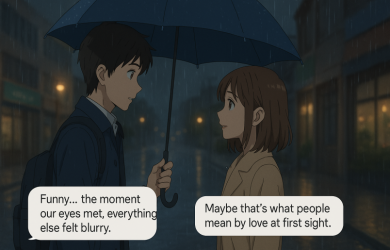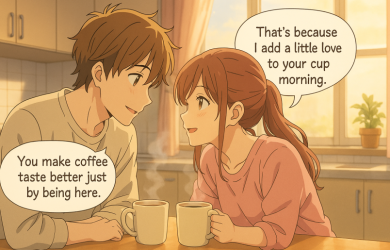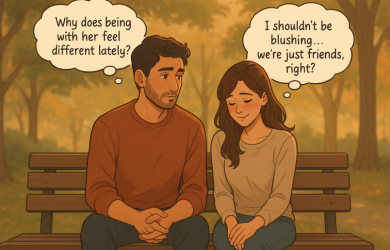Love at First Sight vs Love After Being Friends

Unlock Daily 30-Sec Tips for a Happier Relationship
👉 Subscribe FREEKey Takeaways
Marriage.com AI Quick Summary
Is love at first sight the real deal, or is the strongest foundation for romance built on friendship? Toss aside your old notions because it’s time to delve into the heart of what makes relationships tick.
Love after being friends doesn’t just offer a plot twist in rom-coms; it’s a reality for many, challenging the spontaneity of love at first sight. Falling in love with a friend isn’t a backup plan—it’s a journey filled with deep connection and understanding.
As we explore love at first sight vs. love after friendship, consider this: can friendship turn into love? The answer might surprise you, reshaping how you view the path to finding true love.
What is the case for love at first sight?
Many people ask – Is love at first sight real?
Love at first sight fascinates with its immediate, intense attraction, suggesting it could evolve into deeper affection.
Contrarily, love after being friends offers a gradual, deepening connection rooted in understanding and shared experiences.
Research shows love at first sight is often instant and primarily physical, more common among men, and can happen repeatedly.
It challenges the gradual relationship progression from friendship to love, highlighting a contrast with love after being friends for years, which develops over time, building on mutual respect and emotional bonds.
Is it possible to fall in love after being friends?
Falling in love after being friends is not only possible but common. Love after being friends blossoms from a foundation of mutual respect, understanding, and shared experiences, transforming an already strong bond into something deeper.
Unlike the instant spark of love at first sight, love after being friends develops gradually, allowing both individuals to truly appreciate each other’s qualities. This process often includes significant signs of falling in love with a friend, such as increased affection, desire for more one-on-one time, and a deep emotional connection.
This phenomenon suggests that a deep and lasting romantic relationship can emerge from friendship, offering a compelling contrast to the idea of love at first sight.
An investigation conducted by Elisabeth Camirand and François Poulin from Université du Québec à Montréal demonstrates the links between intimacy and conflict with the best friend and the romantic partner on psychological well-being in emerging adulthood.
This illustrates the impact of intimate friendships on individuals’ well-being and the intertwining nature of friendships and romantic relationships in shaping psychological outcomes.
Which is more likely – Love at first sight of love after being friends?
Determining whether love at first sight or love after being friends is more likely involves exploring historical anecdotes and scientific research.
While love at first sight offers a romantic notion celebrated throughout history, scientific evidence leans towards love that develops after friendship as having a greater likelihood of lasting. This suggests that a deeper bond formed over time might be a stronger predictor of long-term relationship success.
-
What does history say?
In history, tales of love at first sight have often captured our imaginations. Romantic stories and folklore frequently depict love at first sight as a powerful and instantaneous connection. However, these stories often focus on the initial spark of attraction rather than the long-term development of a relationship.
On the other hand, history also highlights numerous narratives of love blossoming from friendships. Many enduring love stories have roots in friendships that gradually evolved into romantic relationships, emphasizing the significance of deep emotional connections and shared experiences.
-
What does science say?
Scientific studies suggest that while love at first sight can occur, it is often based on immediate physical attraction and infatuation, which may not necessarily lead to long-term commitment.
Research has shown that feelings of love at first sight are often predictable based on physical attraction, and the initial rush of emotions may be driven by biological processes such as the release of oxytocin, known as the “love hormone.”
Additionally, a 2017 study that utilized online dating, laboratory studies, and dating events found that feelings of love at first sight were largely predictable based on physical attraction, but the sensation was not linked to long-lasting love.
Conversely, studies have emphasized the value of friendship as a foundation for lasting love. Building a strong friendship first allows individuals to develop a deeper understanding of each other, fostering trust, compatibility, and shared values, which are crucial for long-term commitment and enduring love.
FAQs
When you try to understand the complexities of love and friendship, it often leads to intriguing questions about the nature of our relationships. Here’s a concise guide addressing some common queries with clarity and empathy.
-
Can you fall in love with someone after being friends for years?
Absolutely! Long-term friendships can gradually evolve into romantic love. As you deeply understand each other’s virtues and flaws over time, the foundation for a strong, loving relationship is often already laid, making the transition to love a natural development.
-
Can friends eventually fall in love?
Yes, friends can indeed fall in love. This transition from friendship to love happens when mutual understanding, respect, and shared experiences foster a deeper connection, sparking romantic feelings that may have been simmering beneath the surface all along.
-
Can love at first sight be true love?
Love at first sight can feel like true love due to the intense initial attraction and emotional connection. While it’s a genuine experience for many, true love typically requires time to develop as you get to know each other beyond the initial spark.
Still unsure if love at first sight is worth it? Know these facts to help you gain clarity:
-
Is love at first sight too good to be true?
While love at first sight may seem too good to be true, it’s a real experience for some. However, lasting love involves more than initial attraction, requiring effort, understanding, and growth together. What starts as love at first sight can evolve into a deep, enduring relationship.
Choosing our journey of love
As we gaze into the future of love and relationships, it’s evident that both love at first sight and love after being friends hold profound potential for deep, meaningful connections. The initial spark of instant attraction and the slow burn of friendship-turned-romance each offer unique pathways to love’s fulfillment.
Looking forward, we can anticipate a landscape where both experiences are valued for their contributions to the tapestry of human emotion. Embracing the diversity of love’s beginnings promises a richer understanding of the many ways we can find and nurture love in our lives.
 Tips
Tips
Write your tip or submit a video tip
All tips are reviewed before the publishing.
Share this article on
Want to have a happier, healthier marriage?
If you feel disconnected or frustrated about the state of your marriage but want to avoid separation and/or divorce, the marriage.com course meant for married couples is an excellent resource to help you overcome the most challenging aspects of being married.
Recent Articles
Related Quizzes
Unlock Daily 30-Sec Tips for a Happier, Healthier Relationship
👉 Subscribe FREE on YouTube We'd love your feedback!
We'd love your feedback!
 Expert Q&A
Expert Q&A
Ask your question related to this topic & get the support you deserve from experts.



















 Thanks for your feedback!
Thanks for your feedback!